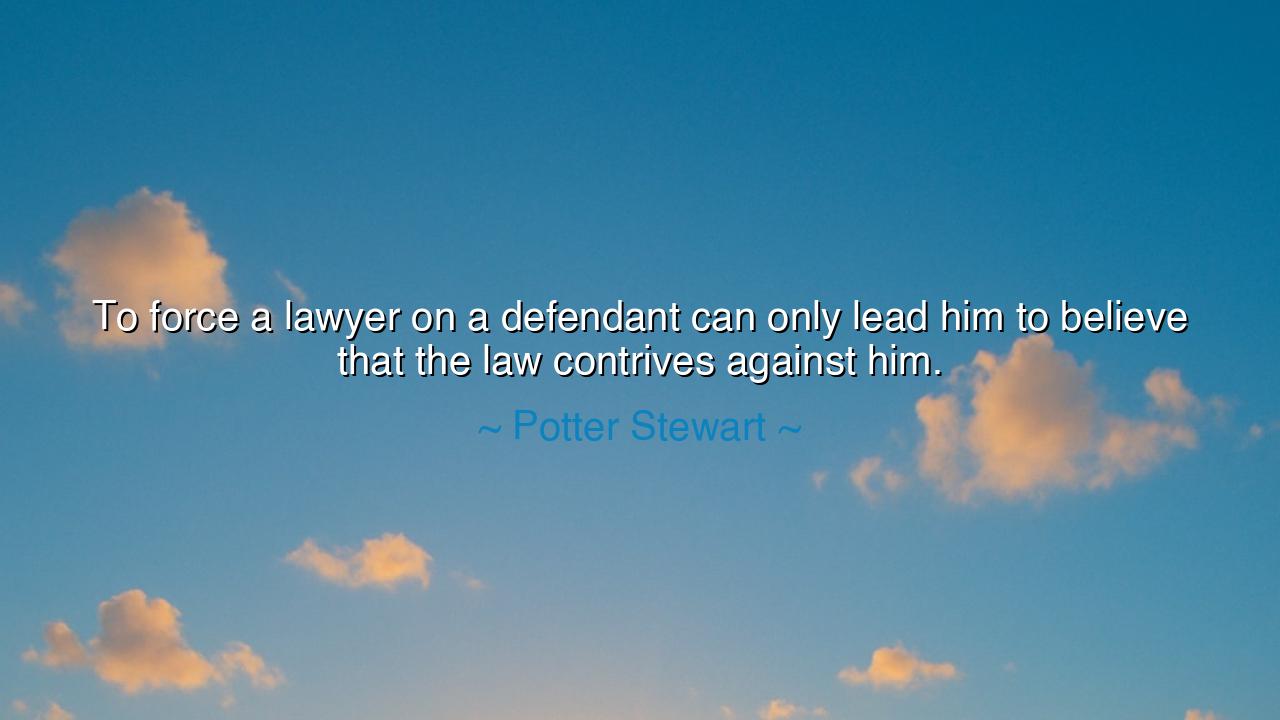
To force a lawyer on a defendant can only lead him to believe
To force a lawyer on a defendant can only lead him to believe that the law contrives against him.






Hear now the solemn wisdom of Justice Potter Stewart, who served upon the highest court of the land and saw with clarity the dangers of injustice disguised as fairness: “To force a lawyer on a defendant can only lead him to believe that the law contrives against him.” These words are not light, nor idle, but cut to the very heart of trust between citizen and law. For the law is not merely rules and punishments—it is a covenant of belief, a bond of faith between the governed and those who govern. When that faith is broken, even justice itself becomes a mask for tyranny.
The meaning of this saying rests upon the fragile balance between freedom and protection. The law offers the accused the right to counsel, so that no man or woman stands alone before the might of the state. Yet Stewart warns that this right, if twisted into coercion, becomes its opposite. To force a lawyer upon one who does not desire it is not to protect, but to dominate; not to ensure fairness, but to sow suspicion. The defendant, already fearful and beleaguered, may then see the lawyer not as an ally, but as another instrument of control, proof that the machinery of justice is bent against him.
History gives us examples of this peril. In the courts of authoritarian regimes, “lawyers” are often assigned not to defend the accused, but to silence them. In Stalin’s show trials, defendants were given counsel who spoke not on their behalf but against them, serving the state’s purpose rather than the client’s. The condemned understood this mockery at once, and their faith in justice was shattered. Here we see Stewart’s truth: when the appearance of defense is forced, it becomes a weapon of oppression, convincing the accused that the law contrives rather than protects.
Consider also the case of Clarence Earl Gideon, a poor man in Florida in the 1960s, who was forced to defend himself because the court would not provide him with a lawyer unless it was a capital case. He failed, and was convicted. But his persistence led to the landmark Supreme Court decision in Gideon v. Wainwright, which guaranteed the right to counsel for all who cannot afford one. Here, the lesson was the opposite side of Stewart’s warning: without counsel, the law abandons fairness; with forced counsel, the law corrupts trust. Justice lives only when the right is offered freely, and when choice remains in the hands of the accused.
Mark this well, O listener: the heart of Stewart’s teaching is that justice must not only be done, it must be seen to be done. A defendant must feel that his advocate truly stands with him, chosen or accepted, not imposed. Otherwise, the entire edifice of law is tainted, for law without trust is but a cage, and defense without faith is but another form of prosecution. The dignity of the individual is the foundation of legitimacy, and when that dignity is ignored, suspicion corrodes the entire system.
Let this be the lesson: guard the freedom of choice in all things that touch the rights of individuals. Offer counsel, but never compel it. Guide, but do not coerce. For the spirit of justice is not domination, but respect; not contrivance, but fairness. The true strength of the law lies not in its power to command, but in its ability to win the confidence of those it governs.
Therefore, O child of tomorrow, when you walk in the halls of justice, remember Stewart’s warning. Do not be content with the appearance of fairness—seek its reality. Honor the rights of the accused, not as obstacles, but as sacred protections of liberty. And if ever you wield authority, wield it with humility, lest you turn trust into suspicion, and law into an enemy of the people it was meant to serve.
Thus, the words of Potter Stewart endure as a beacon: forcing counsel breeds mistrust, but offering counsel preserves faith. And faith in justice, once lost, is the hardest of treasures to regain.






AAdministratorAdministrator
Welcome, honored guests. Please leave a comment, we will respond soon